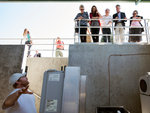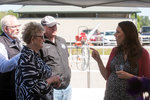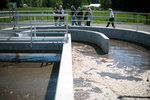





TOLEDO — It’s likely that few who have ever been to the towns of Toledo, Vader or Pe Ell would ever make the mistake of labeling them as “too affluent” for, well, anything.
Those who are familiar with the cities might chuckle at the notion.
But when that very designation precludes the towns from receiving federal grant money meant to help spur economic growth and healthy communities, the miscalculation becomes no laughing matter.
On Friday morning, U.S. Rep. Jaime Herrera Beutler of Washington’s 3rd District made a trip to Toledo to once again see firsthand the people and place impacted by what she and others consider an obvious mislabeling.
During her visit, Herrera Beutler toured Toledo’s new wastewater treatment plant, which was constructed in large part thanks to federal funds that the town no longer qualifies for.
Last year, the federal government began consulting new data collected via census in order to determine which communities meet the low income standards required to receive federal dollars.
The U.S. Department of Housing and Urban Development used data from the American Community Survey to determine Morton, Pe Ell, Toledo and Vader were too affluent for the Community Development Block Grant program, which is designed to help communities with low-income residents.
According to Herrera Beutler, those numbers have since been proven to come with as much as a 91.5 percent margin of error.
“I’ve seen some pretty egregious oversights (in my career),” said Herrera Beutler.
The difference, she said, is that the inaccuracies have been pointed out and the Housing and Urban Development department has thus far opted not to correct the issue.
“I don’t know if I’ve ever seen that before,” added Herrera Beutler.
Since being given the boot from the grant list, Vader has paid for an independent survey to be conducted in order to prove the true depths of the town’s income level. That survey was paid for out of the city’s limited coffers but did succeed in once again making the town eligible for the federal funds.
“The data they are using is flawed. My problem is that they (HUD) now know the data is flawed and have neglected to do anything about it,” said Herrera Beutler. “You can be wrong but you can’t stay wrong.”
Morton Mayor Dan Mortensen said that his town has also been recently disqualified from receiving federal grant money. Herrera Beutler was shocked to learn of that development and promised to have it looked into right away.
Herrera Beutler said that these types of grants are important because they go toward “critical projects,” adding that, “Nobody builds a superfluous wastewater treatment plant. It’s something they need.”
The miscategorization of small towns as “too affluent,” means that, “something like this wouldn’t be possible in other towns now,” said Herrera Beutler in reference to Toledo’s high tech wastewater plant.
The congresswoman said she was disappointed to have to return to Toledo under such circumstances, but noted that, “For me this is just an opportunity to get more supporting evidence to take to HUD and my colleagues about why we need to fix this.”
Herrera Beutler estimated that about 70 percent of her work as a U.S. representative revolves around small projects similar to the grant issue, where she is simply “clearing away the bureaucracy.”
The solution to the flawed data and resulting mislabeling of the Lewis County towns that Herrera Beutler prefers is for HUD to simply relent and change its flawed data. However, she noted that they have been pushing back on that suggestion, adding, “I’m starting to get frustrated because it’s been over a year now. Now I expect HUD to fix it.”
The congresswoman stated that she intends to give HUD the duration of the summer to fix the data before she aggressively pursues other angles.
Another angle that she is considering is to work through the Legislature in a way “that’s more directive than suggestive.”
Herrera Beutler noted that allowing individual cities to conduct their own surveys and then receive federal compensation for the work is one possible option.
Expanding the census effort so that it is more comprehensive, with a presumably smaller margin of error, is another option.
Herrera Beutler noted that she understands the frustrations of small town residents over the disconnect between their day to day reality and the “alternate reality” that the federal government insists on using as a barometer for doling out grant funds. She noted that the problem is especially confounding when alternate government measures regularly confirm the low income status of the towns.
“I think they’re being totally reasonable,” said Herrera Beutler. “It shouldn’t take an act of congress to fix that, but it may.”